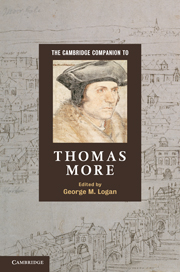Book contents
5 - Thomas More and the heretics: statesman or fanatic?
from Part I - Life, times and work
Published online by Cambridge University Press: 28 May 2011
Summary
Thomas More’s dealings with heresy and heretics have been the most bitterly contested aspects of his career. Even within his lifetime they aroused controversy, as his own Apology demonstrates. John Foxe’s famous ‘Book of Martyrs’ cast More, along with the Tudor bishops, among the deepest-dyed villains, and the stories it told, true and false alike, have been handed down and continue to be supplemented and embellished to this day. Thus Brian Moynahan has bizarrely proposed that More, from his confinement in the Tower of London, masterminded the taking of William Tyndale in Antwerp; while the numbers of heretics executed during More’s chancellorship were recently inflated from half a dozen to ‘a few hundred’ by one of England’s leading journalists; and in 2009 a novelist won the Man Booker Prize for Fiction (appropriately enough) with a story in which she has More admit in conversation the allegations of torture he denied in print. Which all goes to show that, while there have always been admirers for whom Thomas More was a ‘man for all seasons’, there have always been critics for whom he was a fanatical persecutor.
More’s Tudor critics mostly censured him not for persecution as such but for persecuting the wrong people, namely Protestants. Today’s critics censure him rather for the fact of the persecution, and for his emotional intensity in going about it, than for his particular choice of victims. The contrast that mattered for John Foxe was between papist and Protestant; the contrast that matters more today is between the apostle of tolerance some detect in the author of Utopia and the inquisitorial magistrate who became Henry VIII’s lord chancellor.
- Type
- Chapter
- Information
- The Cambridge Companion to Thomas More , pp. 93 - 115Publisher: Cambridge University PressPrint publication year: 2011
- 2
- Cited by



